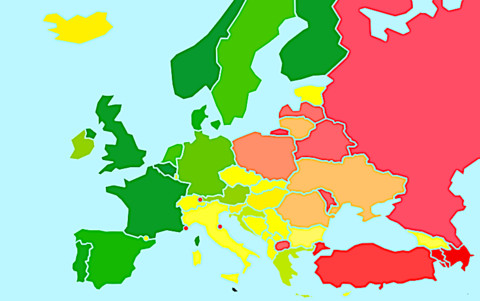LGBT Rights Under Threat in Un-unified Europe
Malta is the best place in Europe to be gay, according to its laws. Azerbaijan is the worst, but Latvia and Poland, which are EU members, do not rank much higher, while overall progress is "stagnating".
Those were the findings of the annual Rainbow Europe survey published on Tuesday (15 May) by Ilga-Europe, an NGO in Brussels.

ILGA-Europe's 2018 map: from green (gay-friendly), to red (hostile) (Photo: rainbow-europe.org)
Malta scored 91 percent in the ranking, which looks at countries' pro-LGBTI rights laws and policies after it passed legislation on marriage equality and gender-neutral passports.
It was followed by Belgium (79 percent), Norway (78 percent), Finland (73 percent), France (73 percent), and the UK (73 percent).
Denmark, Portugal, and Spain also scored well, completing an arc of gay-friendly states, shown in green on ILGA-Europe's map, in northern and western Europe.
Marriage equality also became reality for same-sex couples in the EU heartland last year, but faint-green Germany (59 percent) still lacked laws to protect LGBTI people from hate speech.
The situation became grimmer as one headed south to Italy (27 percent) and east to Poland (18 percent), where the map turned yellow and amber.
"LGBTI people in Poland continued to encounter discrimination," and the Polish government was putting pressure on rights NGOs, Ilga-Europe said. "Physical attacks reported by individual LGBTI people [in Poland] are not just statistics. They are personal cases," it said. The map turned red the further east and south one traveled to Russia (11 percent), Turkey (9 percent), Armenia (7 percent), and Azerbaijan (5 percent).
News emerged of anti-gay pogroms in Russia's Chechnya province in developments that showed the link between protection of LGBTI minorities and broader civil liberties and rule of law standards, Ilga-Europe said.
"The efforts of investigative journalists to expose what was happening in Chechnya remind us of the importance of the fundamental freedom of expression," it said.
Turkey put LGBTI defenders in prison as part of its post-2016 coup crackdown on civil society and police fired rubber bullets at a makeshift Pride march in Istanbul.
Azerbaijan police snatched gay men in Baku, beat them, and subjected them to forced medical exams.
The horrors on the edge of Europe aside, the rise of far-right and illiberal politicians posed a threat of regression in EU states, Ilga-Europe warned.
It spoke of a "worrying … the political climate of rising levels of populism, nationalism, and civil society scapegoating".
"Trends like populism and nationalism aren't just political buzzwords - they can have a lasting impact on the lives of LGBTI people in Europe. There are too many signs around us that many of the recent wins are fragile," the NGO's Evelyne Paradis said.
Even in Europe's green belt, some countries which were once frontrunners on gay rights began "stagnating" last year, Ilga-Europe warned, noting that the Netherlands (60 percent), for instance, had dropped outside the top 10.
LGBTI people in Malta, the top-ranked, still suffered from "hate speech" and "intolerance", the NGO noted.
In Belgium, Europe's second most gay-friendly country, an equality body called Unia "highlighted rising numbers of discrimination cases based on sexual orientation being referred to it," the NGO said.
Its survey of 49 states described Europe overall as "a region where advances are not being made at the rate they once were".
"This lack of sustained progress on LGBTI equality issues should set off alarm bells," Ilga-Europe said.
By ANDREW RETTMAN

Comments